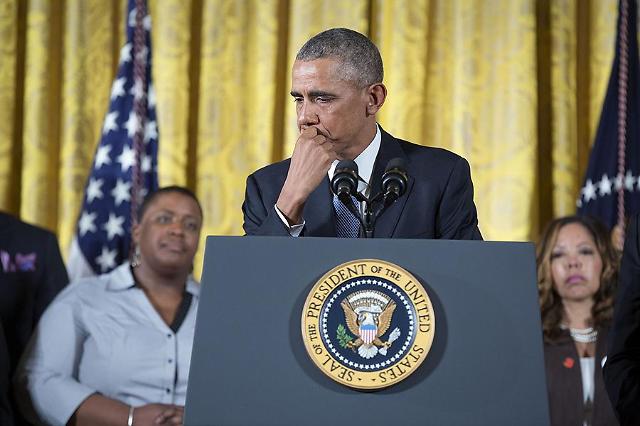
[Courtesy of Whitehouse]
U.S. President Barack Obama and South Korean President Park Geun-hye on Thursday agreed to work on a "united and strong international response to North Korea's latest reckless behavior” after the North claimed it had successfully tested a powerful nuclear bomb.
Obama and Park spoke by telephone for 20 minutes about the international response to North Korea's nuclear test which has greatly raised stakes in the raised stakes over the reclusive state’s banned nuclear program. .
In a separate phone call with Japanese Prime Minister Shinzo Abe, Obama reaffirmed the U.S. commitment to Japan's security and the two leaders "agreed to work together to forge a united and strong international response to North Korea's latest reckless behavior," the White House said in a statement.
Earlier on Thursday, US Defense Secretary Ashton Carter vowed to protect South Korea with “all aspects of United States' extended deterrence” in a telephone call with South Korean Defense Minister Han Min-koo.
"Secretary Carter reaffirmed the ironclad commitment of the United States to the defense of (South Korea,) and that this commitment includes all aspects of the United States' extended deterrence," the Pentagon and South Korea’s defense ministry said in a joint statement on Thursday.
The statement added, "Carter and Han agreed that North Korea's provocations should have consequences," without giving further details. About 28,500 US troops are stationed in South Korea and the two forces have very close military ties.
Han separately told lawmakers in Seoul that that the military was exploring possible options including the resumption of loudspeaker broadcasts along the inter-Korean border. Loudspeaker broadcasts of propaganda ratcheted up tensions between North and South last year.
But Han said that the Sooth government opposed having its own nuclear weapons.
"We consistently pursue the Korean peninsula's denuclearization," Han Min-koo, the defense minister, told lawmakers, rejecting growing calls for a South Korean nuclear deterrent against the North.
North Korea’s nuclear test drew threats of further sanctions even though the United States and weapons experts voiced doubts the device was as advanced as the communist state claimed
The U.N. Security Council said it would begin working immediately on significant new measures, including broadening sanctions against North Korea. But analysts say major powers will likely be reluctant to take the tough steps necessary to force Pyongyang to abandon its weapons program.
The North’s announcement on Wednesday that it had tested a hydrogen device, much more powerful than an atomic bomb, came as a surprise.
North Korea also said it was capable of miniaturizing the H-bomb, in theory allowing it to be placed on a missile and potentially posing a new threat to the U.S. West Coast, South Korea, and Japan.
Analysts say it is unlikely that major powers will be willing to take the tough steps necessary to force Pyongyang to abandon its weapons program.
North Korea is already under a wide array of international sanctions, and U.N. Security Council members were expected to discuss the possibility of adding to these in coming days.
China, North Korea’s neighbor, and main ally, may support more U.N. sanctions but within limits, for fear of increasing tension on the Korean Peninsula. .
By Alex Lee


![[OPINION] North Koreas provocations highlight South Koreas success](https://image.ajunews.com/content/image/2024/01/10/20240110171737102169.jpg)
![[OPINION] Could North Korea launch a Hamas-like attack?](https://image.ajunews.com/content/image/2023/10/20/20231020155720666173.png)
![[COLUMN] Can North Korea give us a reason to live?](https://image.ajunews.com/content/image/2023/09/12/20230912172249735183.jpeg)